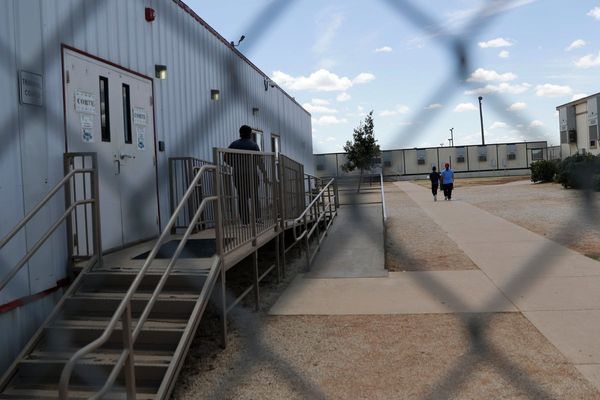Insmed stock is trading at a 25-year high as the biopharma company approaches the potential approval of what Chief Executive Will Lewis says could be a "skeleton key" for numerous inflammatory diseases.
The Food and Drug Administration is scheduled to make a decision on Aug. 12 on the fate of the drug called brensocatib. Insmed is angling to be the first company to win approval for a treatment for non-cystic fibrosis bronchiectasis, a chronic lung condition in which the airways become widened and damaged.
If approved, brensocatib would be the first treatment specifically for bronchiectasis. It could also be a $5 billion opportunity.
And that's just the tip of the iceberg, says Lewis. Insmed is also testing brensocatib in another lung condition and a skin disease. It all comes down to how brensocatib works. The drug blocks DPP1, an enzyme that plays a role in inflammation and immune response.
Though bronchiectasis is a lung condition and hidradenitis suppurativa is a skin condition, both are tied to the DPP1 pathway. So, brensocatib could actually treat both, CEO Lewis said.
"When we saw that universal response, we knew we had one of those skeleton key mechanisms of action that are rare in biotechnology, where the fundamental disease process is affected at its point of origin," he told Investor's Business Daily.
Discover Top Growth Stocks With IBD Leaderboard
Insmed Stock: Facing Off With Skeptics
BofA Securities analyst Jason Zemansky says there's still a lot of skepticism on the Street about Insmed's $5 billion-plus guidance for brensocatib. If approved next month, it won't be immediately clear if Insmed hit a grand slam until the first quarter of 2026, he said in a recent report.
But Lewis remains bullish.
Beyond bronchiectasis, Insmed is testing brensocatib in patients with chronic rhinosinusitis without nasal polyps and the skin condition called hidradenitis suppurativa. By the end of the year, he expects to have updated information from studies in rhinosinusitis patients. Early next year, Insmed plans to release updated results from its HS study.
Lewis says blocking DPP1 could also work in diseases like chronic obstructive pulmonary disease, or COPD, asthma, rheumatoid arthritis and inflammatory bowel disease.
"The breadth and potential of this molecule really is just beginning to be understood," he said.
Ahead of the Aug. 12 decision date, Leerink Partners analyst Joseph Schwartz called Insmed a "core rare disease/blockbuster platform company holding for investors." Schwartz rates Insmed stock an outperform.
Insmed's Next Big Drug
Schwartz's call followed another high-profile readout from Insmed in June. The company is testing a drug called treprostinil palmitil inhalation powder, or TPIP.
On June 10, Insmed stock skyrocketed nearly 29% after the company released the results from a test of TPIP in patients with pulmonary arterial hypertension. The results exceeded Schwartz's "best-case scenario." Shares broke out of a consolidation with a buy point at 84.91, MarketSurge research shows. Since then, Insmed shares have surged to a profit-taking zone, 20% to 25% above their entry.
Pulmonary arterial hypertension, or PAH, is a form of high blood pressure that occurs in the arteries of the lungs. The symptoms worsen over time and include shortness of breath, fatigue, dizziness, chest pain and swelling of the extremities.
Insmed ran its study for 16 weeks and took the final results 24 hours after patients received its drug. Patients who received TPIP had a 35% greater improvement in pulmonary vascular resistance than those given a placebo. Pulmonary vascular resistance measures blood flow in the lungs. Patients also showed a 35.5-meter improvement in how far they could walk over six minutes vs. the placebo group.
RBC Capital Markets analyst Leonid Timashev expected just a 20% improvement in pulmonary vascular resistance and 20-meter placebo-adjusted improvement in walking distance. He called the results a "home-run scenario."
"We see no red flags in the data given the strong efficacy, tolerable profile, and robust stats, and see a clear path towards ph.III success and ultimate commercialization, with today's win likely to shift investor discussions towards the (brensocatib) launch and M&A potential," he said in a report.
Timashev raised his price target on Insmed stock to 106 from 99 and kept his outperform rating.
Rivaling United, Liquidia
With TPIP, Insmed is going up against United Therapeutics and Liquidia. Both sell treatments for PAH and pulmonary hypertension associated with interstitial lung diseases, or PD-ILD. Insmed is also testing TPIP in patients with PH-ILD.
United's Tyvaso and Liquidia's Yutrepia are both inhaled forms of treprostinil. But Lewis says there's a key difference with TPIP. Insmed added in a 16-carbon chain with a specific type of bond. These changes allow the drug to be inert when it's inhaled. Over time, TPIP slowly releases into the body.
Tyvaso and Yutrepia don't use the same carbon chain and bond, Lewis said. This means their drugs must be administered, on average, four times a day. TPIP, on the other hand, is being tested as a once-daily treatment. Meanwhile, United and Liquidia have been long embroiled in a patent dispute.
Though there are treatments for PAH and PH-ILD, there's still a lot of work to do, Lewis says. Both are "fatal conditions and so innovation is still needed to prevent that from becoming the outcome for patients," he added.
Lewis says Insmed is now discussing with the FDA how they should proceed with Phase 3 testing for TPIP.
"From my perspective, we can't get to market soon enough," he said.
Analysts Are Bullish On Insmed Stock
Wall Street is fairly bullish on the company's chances with all 19 analysts that track Insmed stock rating it a buy or overweight, according to FactSet.
BofA's Zemansky says TPIP could become a "foundational" treatment for PAH and PH-ILD. There's little to "quibble with" about the company's results in those diseases, he said. Beyond TPIP and brensocatib, Insmed already sells Arikayce, a treatment for another lung condition.
Arikayce sales are growing slowly and analysts expect it to become a blockbuster drug in 2030.
"As a company, we're three for three, which is extremely rare," CEO Lewis said, referencing Arikayce, brensocatib and TPIP. "The momentum is definitely with us."
Follow Allison Gatlin on X/Twitter at @AGatlin_IBD.







